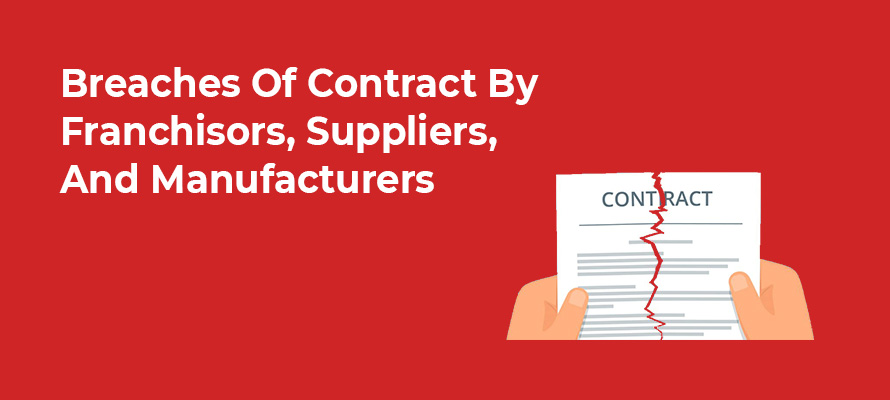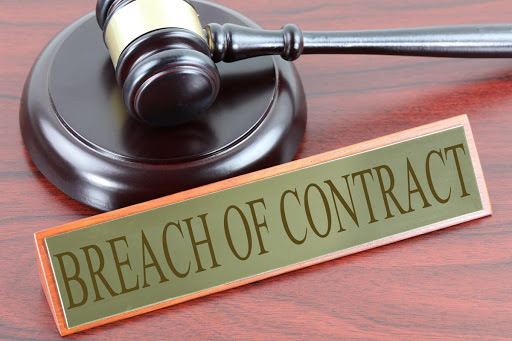Breach of Contract
A breach of contract is a violation of the agreed-upon terms and conditions of a given agreement. The breach could be anything such as late payment to a more severe violation like failure to deliver a promised asset.
A contract will hold weight if taken to court. It is imperative to be able to prove that when a violation occurred.
The result is very wispy. The noncommittal language in these agreements often creates obligations that are deceptive on the part of the supplier, manufacturer, and franchisor.
Understanding what is meant under breach of contract
A breach of contract occurs when one of the parties breaks the terms and rules of sign an agreement between two or more parties. This includes an obligation stated in the contract and not completed on time, or you are late with a rent payment. Sometimes when it is not fulfilled at all.
The process of dealing with a breach of contract is written in the original contract. For example, in agreement, it is written that in the event of late payment, the offender must pay a $25 fee and the missed payment. If the consequences for a specific violation are not included in the contract, then the parties involved may settle the situation among themselves, leading to a new deal, another type of resolution.
Types of breach contract
Some people think that a contract breach is minor or material.
There are two types of breach contract:
- Material breach
- Actual breach
- Minor breach
Material breach
A material breach is when you receive something different from what was stated in the agreement. For example, your firm contracts with a vendor are to deliver 200 copies of a bound manual for an auto industry conference. But when the boxes arrive at the meeting, there are only gardening brochures instead.
Actual breach
An actual breach is when one party refuses to perform the terms of the contract.
Anticipatory breach
When a party said in advance that they would not be delivering on the terms of the contract.
Minor breach
A minor breach is when you don’t receive an item or service on the due date. For example, you bring a suit from your tailor. The tailor promises to make an oral contract that he will deliver the suite in time for your outstanding presentation, but in reality, he gives it a day later.
Some legal issues concerning breach of contract
A person who brings an agreement to the court and claims that there has been a breach of contract existed between the parties. The person also demonstrates how the defendant (the one against whom a request) or charge is brought in a court failed to meet the contract’s requirements.
Is contract right?
The simple way to prove this is to make a contract with a written document signed by both parties. It is also possible to enforce an oral contract with certain types of agreements. But it is necessary to have a written contract to carry any legal weight. These kinds of deals include the sale of goods for more than $500, the sale or transferring of land from one party to another party, and contracts that remain in effect for one year after the date on which the parties sign the agreement.
Court first sees the signs of both parties and determines whether they have fulfilled their obligations or not. Courts will also examine the contract to see if it contains any modifications that could have triggered the alleged breach.
Reasons for breach a contract
The court will know all legal reasons for the breach of contract. The person might claim that the contract was a fraud because the plaintiff either misrepresented all material facts. The defendant can argue that the contract was signed under many other witnesses, who applied threats or physical attacks towards the defendant to sign the given agreement. The errors made by both parties contributed to the breach.
Inadequacy of the Support and Training Leads to Contract Claim’s Breach.
Frequently, suppliers’ and franchisees’ inadequacy of the training and support provided by their franchisor, manufacturer, or supplier is focused on contract breach. The contract was breached is commonly argued between suppliers and Franchisors that when the supplier system or franchise format, a change was made. Sometimes changes are required by suppliers, manufacturers, or franchisors, which can be costly—for instance, substantial remodeling. Like other mandatory modifications, computer changes can cost less, but unreasonably disruptive to a supplier’s or franchisee business.
When a manufacturer’s franchisor, supplier, or duties are not explicitly identified, more difficult legal challenges may arise in the franchise agreement or relevant distribution.
Most distribution agreements or new franchises classify the breaches into serious breaches and insubstantial breaches. The non-breaching party seriously allows violations usually for automatically terminating the agreement upon termination to the breaching party and service of a notice of default. While on the other hand, the default less severe infringements result, but without any immediate termination. Here is a tremendous asymmetry of the rights and obligations specified in franchise and supplier agreements. Although the accords of supplier and franchise provide prolific bases of a material default by a dealer or franchisee, in any similar bases of a material default by a franchisor or supplier, these same agreements list few.
However, there are possibilities to destroy the franchisee or dealer’s businesses and personal resources when the default process against a franchisee is used. Yet, against a franchisor or supplier when the default process is applied, to utilize written directly into the agreement. To terminate a franchisor or supplier, these include the absence of a franchisee or dealer’s right or the lack of rule violation by a franchisor or supplier.
If Your Franchisor or Supplier Breaches your Franchise Agreement or Distribution, then What to Do?
The franchisee lawyer must get contacted and represents only franchisees and dealers If a dealer or franchisee suspects that their franchise agreement might have been breached. Before approaching your supplier, manufacturer, or franchisor, if a breach is suspected, you should work and consult with a franchise lawyer to provide you a legal cover for the anticipated retaliatory response. This type’s answer is likely to be asserted by your supplier or franchisor as a reaction to your complaint or inquiry. To resolve a breach issue rather than working amicably. By falsely claiming a breach, the supplier or franchisor will attempt to ‘the playing field’ of the agreement against the dealer or franchisee. A legal protection plan should be implemented as a franchise lawyer, under these circumstances, before forging forward on your affirmative breach of contract allegations, To defend against any counter-attack.
So, as we have a better understanding of the breach in contract, let’s look at the things you must know about the franchise agreement
8 THINGS YOU MUST KNOW ABOUT FRANCHISE AGREEMENTS
Sign a non-disclosure agreement
Though you’ll sign a franchise agreement in the process of setting up a new franchise unit which is the most important legal document, several steps must be taken, which are as follows:
you’ll receive reports when opening a new franchise, and if you consider the sensitive nature of many of them, there’s no wonder that an important role is played by non-disclosure agreements play.
It’s highly likely that before you’re given access to the franchiser’s operations manual, you’ll have to sign a legally binding non-disclosure agreement. All the information is typically contained in it about the franchise model, which is in use by the business.
Pay a deposit on time
Having signed an agreement, many franchises will expect that before the franchise agreement is approved, you should pay a deposit. However, this deposit will be non-refundable in the vast majority of cases, usually only in extreme circumstances. The clauses are allowed by some franchises for permitting the prospective franchisee to back out.
Before you’ve even signed the franchise agreement, these are the two essential commitments. You’ll typically have to make
What you need to know:
The duration of the franchise agreement
Ensure it’s clear whether it’s renewable after the initial contract expires and for how long it lasts.
The purpose of the franchise agreement: for the franchisor
Protect their interests
There are a large number of terms used to protect the franchisor in the franchise agreement. After all, the document that defines the franchisor/franchisee relationship is the franchise agreement and sets out each of the responsibilities parties’ and roles. What kind of terms the franchisor is likely is, it’s important to understand With this in mind, to include to protect their interests.
It’s almost sure that the terms will be included by the franchisor that allows them to monitor a franchisee’s performance. If a franchisee is underperforming, if they fall below a minimum threshold, then take action.
Guarantee integrity of their intellectual property
Likewise, to protect themselves from unfair competition and to guarantee the integrity of their intellectual property. The franchisor will use the franchise agreement.
To act on individual rights, Limit the franchisee’s ability to franchisee most franchise agreements. Finally, a clause that limits the franchisee’s ability is included to act on those freedoms and rights granted by the franchise agreement. In other words, the decisions permitted by the franchise agreement can only be made by the franchisee.
The purpose of the franchise agreement: for the franchisee
Protect their interests
Just like some terms that protect and benefit the franchisor are included in the franchise agreement, there are also terms by which the franchisee gets protect.
What do they get in return for their given investment?
For the most part, the different services and support are terms that detail the franchisor, which must provide to the franchisee. For instance, conditions that dictate how goods and services are supplied are included in nearly all franchise agreements, what training will receive by the franchisee and their staff, and which services will be made available for additional management and support.
What’s included?
So, we’ve established that the franchiser and franchisee’s rights and obligations should be outlined by the franchise agreement. As defined in the code of ethics: Let’s summarize the essential minimum terms:
- The rights granted to the franchisor.
- The rights granted to the individual franchisee.
- The obligations of the franchisor
- The responsibilities of the individual franchisee
- The duration of the agreement
- The basis for the renewal
- The franchisor’s right to change the franchise system franchisor’s pre-emption rights for the terms for when the franchisee can sell and relevant to the franchisee’s use of the franchisors distinguishing identification there are provisions. This includes signs, trade names, trademarks, logos, etc.
- The goods/services to be provided to the franchisee.
- Provisions of terminating the agreement
- The terms of payment by the franchisee
Let’s now look at a couple of these in more detail:
Intellectual property
for any franchise agreement, Intellectual property rights are an incredibly important aspect. They deal with how franchisees can use trademarks, trade names, and copyrights.
the fact that the principal benefits of the franchise system, when you consider the business gets operated by the ability under a well-known and well-respected trade name, the fact that one of the principal benefits of the franchise system, it’s easy to understand
While both the franchisee and franchisor negotiate for the intellectual property over how each party uses it, to ensure that no 3rd party can make the most of it, it is in both of their best interests. Consequently, the franchise agreement mustn’t allow for any external use of trademarks, trade names, or copyrighted materials.
Seek legal advice
an incredible number of legal considerations are there that you need to be aware of when signing a franchise agreement. Therefore, you seek professional guidance from a franchise lawyer is highly recommended. The most critical document in the entire franchising system is possibly the franchise agreement, so understanding its entirety before signing anything is vital.















